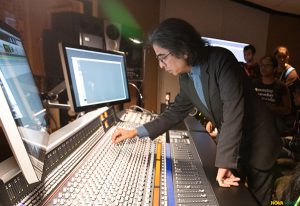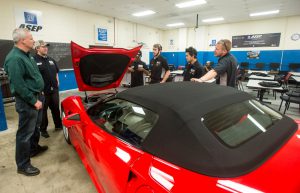Music Recording, Auto Tech Programs Teach Hands-On Skills Virtually
While NOVA faculty and staff have done an amazing job converting all learning and instructional delivery from in-classroom to remote in record time, there are many programs where it would prove extremely challenging to continue instruction online. For example, how do you teach students to fix a car via zoom, or produce a song recording with all the intricate technicalities involved? Well, NOVA’s resourceful and creative faculty have made it happen.
Professor Sanjay Mishra (LO), associate professor and head of Music Sound Recording Technology had to think fast when word started to spread that all NOVA classes would be going online.
Spring semester saw 30 students enrolled in the program. On average, Music Recording faculty teach two to three classes per semester. In spring 2020, Mishra taught five.
He says his faculty have done very well with the transition, but they miss recording with musicians in person. “Recording works virtually,” he says, “but it is not the same. It is difficult to reproduce high-quality audio over Zoom.”
The process definitely takes more time. “But, typically musicians don’t like time limits,” Mishra says. “Online, we don’t have one, so the class just goes until it is done. This is more like the real world they will work in. We may have hit some records in class duration.”
In 26 hours, across two Tuesday class meetings, Mishra’s students produced an original recording heard here: Wake Up. Involved were about 19 people (none in the same room)—nine student musicians, with two acting as producers, Mishra did the final mix, and others gave advice and comment.
Another course it is particularly difficult to teach remotely is Auto Technology. In fact, one could hardly envision a more hands-on skill. But, like the Recording Technology folks, Auto Technology faculty and staff are making it work.
There are 13 courses in the Auto Technology program, being taught by five full-time and three adjunct faculty members. Program Head Keith Brown (AL) says the transition to remote learning has been…interesting.
“Being unable to perform the hands-on component of our classes has been challenging,” he said, “But for the most part, students have been engaged and understanding. There have been some technology issues and learning curves as students adapted to the new format.”
Brown says he spends at least twice the time preparing for classes, trying to make sure the material is engaging students who are not accustomed to learning in front of a computer. He says faculty have adapted well, though. They try to meet virtually on a regular basis and have shared resources with each other. They remain focused on how to overcome the challenges that lie ahead and plan for various scenarios in order to maintain continuity in the program.
“Realizing how much can be done remotely—being forced to deliver a very hands-on subject remotely—has sparked a lot of new ideas and shifted the paradigm of how we teach,” Brown said.
_____________________
Sanjay Mishra is a graduate of the Peabody Conservatory of Music and a veteran of the industry. He has released several CDs of his own and has recorded with Jerry Garcia of The Grateful Dead and other notable musicians. He has also composed music for film. His score for the French film ‘Port Djema’ received the Lifetime Vision Award at the Steven Spielberg-chaired Hamptons International Film Festival. You can explore the recording studio virtually through their Facebook page.
Keith Brown teaches Automotive Technologies in the GM ASEP (Automotive Service Educational Program) at NOVA’s Alexandria Campus. This valuable partnership with General Motors delivers advanced automotive service training, appropriate academic coursework and real world internship experiences to give students the best possible preparation for a career as an automotive technician. Students in General Motors ASEP alternate between classroom training and hands on work experience at a sponsoring GM dealership or ACDelco Professional Service Center. This unbeatable combination of school and work reinforces the technical knowledge gained while in college.


